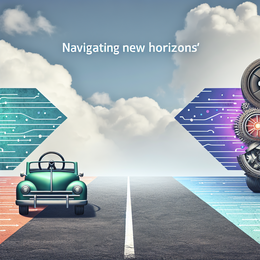![]()
Imagine living in a world where in-vehicle technology isn’t just a tool; it’s a pathway to connect and navigate both literally and figuratively. The automotive industry is experiencing a technological renaissance, with infotainment systems like Google Automotive Services (GAS) at the helm, steering us into an era of integrated convenience. However, this revolution has not come without its challenges. In Germany, competition objections surrounding the bundling of services, such as Google Maps, have led to a significant shift. Can this pivot from Google truly drive us toward a landscape of enhanced vehicular freedom? Let’s delve into the implications of this unbundling offer and forecast the trajectory of in-car services.
The Initial Struggles: Tackling Bundled Giants
The Predicament of Proprietary SystemsThe love affair with integrated in-car systems is one deeply rooted in the desire for seamless connectivity. GAS has, until recently, offered a one-stop-shop for various services. But the crux of the matter lies in how this bundling potentially hinders competition. Vehicle manufacturers in Germany have faced the dilemma between offering these well-oiled Google ecosystems and the desire for autonomy and diversity in the services they provide to their consumers.The Tug-of-war for Open MarketsThis digital tug-of-war has unveiled fundamental concerns about openness and fairness in the market. The controversies alerted regulatory bodies, sparking debates over the correlation between convenience and competitive restrictions. These tough beginnings laid bare the struggles facing innovative tech giants and carmakers striving for balance between integration and independence.
The Turning Point: Unbundling the Nexus
The Pivotal Policy PropositionIn an unexpected yet strategic pivot, Google has proposed to unbundle some of its services. This offer of removing contractual constraints signifies a potential watershed moment for vehicle manufacturers. Now at a crossroads, the industry stands before an opportunity to redefine what in-car services can and should be.Breaking Monolithic ModelsWithin this turning point lies an exhilarating prospect — the dismantling of monolithic models. This unbundling could catalyze a transformative phase in the automotive software space, invigorating competition and fostering a more diversified landscape of applications and services.
Scaling Up: Crafting the New Ecosystem
 Shaping an Open Market InfrastructureThe propitious moment of unbundling services signals the juncture to scale up. Automakers can now envision a more holistic ecosystem. Strategies for technological sovereignty include opting for modular platforms, building partnerships with multiple tech firms, and prioritizing consumer choice more than ever.Empowering Diverse InnovationPost-turning point, scaling involves an acceleration of innovation. Embracing the ethos of competition will likely yield a spectrum of in-car services that are more tailored, personal, and diverse. This period of growth highlights the potential for an automaker’s distinct identity manifesting through the software it elects to feature.
Shaping an Open Market InfrastructureThe propitious moment of unbundling services signals the juncture to scale up. Automakers can now envision a more holistic ecosystem. Strategies for technological sovereignty include opting for modular platforms, building partnerships with multiple tech firms, and prioritizing consumer choice more than ever.Empowering Diverse InnovationPost-turning point, scaling involves an acceleration of innovation. Embracing the ethos of competition will likely yield a spectrum of in-car services that are more tailored, personal, and diverse. This period of growth highlights the potential for an automaker’s distinct identity manifesting through the software it elects to feature.
Lessons Learned: Charting the Course
Harmonizing Competition with IntegrationFrom this series of events emerge invaluable lessons, one being the delicate dance between integration and market competition. The recognition of this balance has forged a new understanding of what it takes to sustainably grow in the technology-centric world of automobiles.Forewarning and ForesightHowever, amidst these triumphs, the automotive industry must engage in introspection, heeding the warnings from past constraints. Caution is advised in avoiding past pitfalls, such as excessive reliance on a single provider and underestimating the momentum of market forces.
The Future: Charting Uncharted Paths
Prospects of Participatory EvolutionLooking forward, the horizon is bright for in-car services, and the roadmap sees innovation in collaboration, user empowerment, and a commitment to a competitively healthy ecosystem. Anticipation surrounds new plans, such as embracing up-and-coming tech start-ups or developing proprietary apps that will enhance customer experiences.Envisioning a Connected TomorrowWith the future underway, the narrative pivots towards a connected tomorrow, where choice, accessibility, and innovation drive forward. The narrative of in-car services is no longer tethered to single solutions but proliferates with possibilities echoing the necessities and desires of a dynamic consumer base.
The Entrepreneurial Drive: Steering Toward Success
The journey through the objection to Google’s service bundling in Germany, to the offer of unbundling, is more than a timeline of events — it represents the tenacity and vision required to navigate the ever-evolving roads of the automotive and tech industries. This juncture not only refines the business ecosystem of car manufacturers but also strengthens the resolve for a future where innovation and competition coalesce, driving the industry towards an even more dynamic and consumer-centric era.Ready to engage with the innovative landscape of tech and automotive services? Connect and collaborate with industry leaders and enthusiasts alike. Let’s explore the untapped potential of an unbundled digital vehicular world together. Join me on LinkedIn and accelerate your journey into the future.
